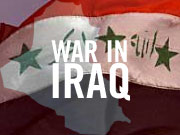Photos
Resources
Your Voice
| ||||||||||||||||||||||||
Bush says U.S. will persevere in Iraq
May 24, 2004
Carlisle, Pa. — (AP) - President Bush, trying to dispel rising doubts about the war, declared Monday night the United States would stay in Iraq until it was free and democratic and suggested more U.S. soldiers might have to be sent to stop enemy forces bent on destroying the new government.
"There are difficult days ahead and the way forward may sometimes appear chaotic," he said. "The terrorists and Saddam loyalists would rather see many Iraqis die than have any live in freedom. But terrorists will not determine the future of Iraq."
In a prime-time address at the U.S. Army War College, he also promised to demolish the Abu Ghraib prison that has become an ugly symbol of the U.S. occupation.
Five months before the U.S. presidential election, violence in Iraq has helped push down Bush's approval rating to a new low and has increased skepticism about his handling of the war.
Democratic rival John Kerry said Bush's speech broke no new ground and "what's most important now is to turn these words into action by offering presidential leadership to the nation and to the world. That's going to require the president to genuinely reach out to our allies so the United States doesn't have to continue to go it alone and to create the stability necessary to allow the people of Iraq to move forward."
|
History is moving, and it will tend toward hope or tend toward tragedy. We will persevere and defeat this enemy and
hold this hard-won ground for the realm of liberty.
- President Bush |
Bush outlined five steps that he said would help Iraq achieve democracy and freedom: transferring authority to a sovereign new Iraqi government on June 30, helping establish security in areas still gripped by chaos, urging broader international support, reconstructing the country and setting up national elections.
"Completing the five steps to Iraqi elected self-government will not be easy," Bush said. "There is likely to be violence before the transfer of sovereignty and after the transfer of sovereignty."
He said that the United States would keep its troop level at the current 138,000 as long as necessary and that commanders were constantly reassessing needs. "If they need more troops, I will send them," Bush pledged.
He spoke for slightly over 30 minutes in a gymnasium converted to a speech hall. The basketball nets were retracted and a makeshift stage assembled for Bush, complete with TelePrompTer.
Hundreds of uniformed military personnel listened respectfully, applauding several times.
With nearly 800 U.S. soldiers killed so far in Iraq, Bush warned that the violence would continue.
He talked of the assassination this month of the president of the Iraqi Governing Council, Izzadine Saleem, and the beheading of American civilian Nicholas Berg. But he continued to express his resolve, saying, "No power of the enemy will stop Iraq's progress."
He said coalition forces and Iraqis have the same enemies - terrorists, illegal militia and loyalists of Saddam Hussein.
"History is moving, and it will tend toward hope or tend toward tragedy," he said. "We will persevere and defeat this enemy and hold this hard-won ground for the realm of liberty."
He took note of the abuse of Iraqi prisoners by U.S. soldiers, saying that the prison that was a symbol of death and torture under Saddam Hussein "became a symbol of disgraceful conduct by a few American troops who dishonored our country and disregarded our values."
He said the United States would pay to demolish the prison and build a new one.
Bush's address coincided with the unveiling of a new U.N. resolution by the United States and Britain endorsing the June 30 handover of political power in Iraq and authorizing a U.S.-led multinational force to keep the peace. The draft resolution urges nations to send troops for an international force - something the administration is anxious to see, with American troops stretched thin.
Other nations have not been stepping forward to make new pledges of military or humanitarian help. Still, Bush said, "Despite past disagreements, most nations have indicated strong support for the success of a free Iraq, and I am confident they will share in the responsibility of assuring that success."
Bush said U.N. envoy Lakhdar Brahimi would put forward the names of the interim government this week. In addition to a president, two vice presidents and a prime minister, 26 Iraqi ministers will oversee government departments from health to justice to defense.
This new government will be advised by a national council that will be chosen in July by Iraqis.
For his speech, the president chose an audience of 450 people meant to highlight his image as commander in chief. The war college trains Army leaders on strategy, military science and other aspects of defense.
While the military has been strongly supportive of Bush during his presidency, some in the command chain and some retired military officers have become increasingly vocal in their criticism of Bush's handling of Iraq.
Retired Gen. Anthony Zinni, who once commanded forces in the Iraq region, said low troop numbers have contributed to the Iraqi insurgency. "Somebody screwed up. And at this level and at this stage, it should be evident to everybody that they've screwed up," Zinni said.
Underscoring the political stakes, Bush chose Pennsylvania as the site of the speech. Bush lost the state in 2000, and has assiduously courted it ever since with an eye to winning it this year. Monday marked his 28th visit there - more than to any other state.
(Copyright 2004 by The Associated Press. All Rights Reserved.)
|
News Headlines
|
Related Subjects
|


